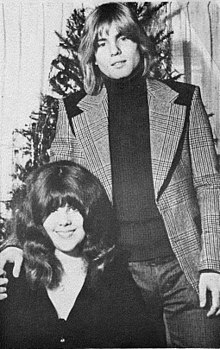Greg Shaw (January 1949 – October 19, 2004) was an American writer, publisher, magazine editor, music historian and record executive.[1]
Greg Shaw | |
|---|---|
 Greg Shaw (right) and Suzy Shaw (left) | |
| Born | January 1949 San Francisco, California, United States |
| Died | October 19, 2004 (aged 55) Los Angeles, California, United States |
| Occupation | Writer, publisher, magazine editor, music historian, record executive |
| Language | English |
| Genre | Journalism, music |
Biography
editShaw was born in San Francisco, California.[1] He began writing about rock and roll music as a young teenager. His first zines were Tolkien-related,[1] but among them was also a mimeographed sheet called Mojo Navigator (full title, "Mojo-Navigator Rock and Roll News") which he founded in 1966 with David Harris.[2] Mojo Navigator is said to have been an early inspiration for Rolling Stone magazine, as its co-founder Jann Wenner befriended Shaw and learned how to produce a rock magazine.[3]
In the 1970s Shaw moved to Los Angeles with wife and partner Suzy Shaw and started the fanzine called Who Put the Bomp, popularly known as simply Bomp!, or Bomp magazine.[4][5] He was hired by United Artists as assistant head of creative services.[3] Shaw's writing appeared in Bomp!, of which he was editor and publisher, as well as in Creem, Phonograph Record (where he again served as editor) and occasionally Rolling Stone.[1][6] During this time, he pursued a long-time project The Encyclopedia Of British Rock. He also later wrote a book about Elton John.[4] Bomp featured many writers who would later become prominent, including Lester Bangs, Greil Marcus, Richard Meltzer, and Ken Barnes.[5]
During the 1970s, Shaw worked for Sire Records, and was instrumental in the signing of Flamin' Groovies, a band that he also managed for a couple of years.[4] In 1974, Bomp! became a record label, and Shaw released records by Devo, the Weirdos and Iggy Pop, and worked with several artists including Stiv Bators and the Dead Boys.[7] He signed, and distributed, power pop and new wave acts such as Shoes, the Nerves, the Plimsouls and the Romantics.[7] Bomp! Records was an LA record store for a couple of years, as well as one of the first independent distributors in the U.S.[7]
In the 1980s, Shaw helped launch the garage revival scene with bands such as the Miracle Workers and the Pandoras.[8] He also released music by Spacemen 3 and the Brian Jonestown Massacre in the mid to late-1990s, and appears in the Sundance award-winning documentary Dig!.[6] In 1994, he associated with Patrick Boissel's Alive Records, a label with music by the Black Keys, Two Gallants, the Bobby Lees, Radio Moscow, Swamp Dogg and many other artists.
In addition, he was known as a record collector, and historian, and started the Pebbles collection album series in the early 1980s.[3][6]
Greg Shaw died of heart failure in Los Angeles at the age of 55.[1]
References
edit- ^ a b c d e Sisari, Ben (October 27, 2004). "Greg Shaw, 55, Rock Enthusiast Who Loved Underground Music, Dies". The New York Times.
- ^ Franklin, Ieuan. "Grey Matter/Literature/Area: Bucketfull of Brains, Fanzine Form and Cultural Formation" (PDF). eprints.bournemouth.ac.uk. Bournemouth University. pp. 15–16.
- ^ a b c Cartwright, Garth (29 October 2004). "Greg Shaw Obituary". The Guardian.
- ^ a b c Talevski, Nick (2010). Rock Obituaries: Knocking On Heaven's Door. Omnibus Press. p. 587. ISBN 9780857121172.
- ^ a b "Bomp! History". bompstore.com.
- ^ a b c "Greg Shaw". The Independent. 28 October 2004.
- ^ a b c Kaleta, Sabrina (November 18, 1999). "Accidental Genius". Phoenix New Times.
- ^ "Greg Shaw". The Times. 2 November 2004.